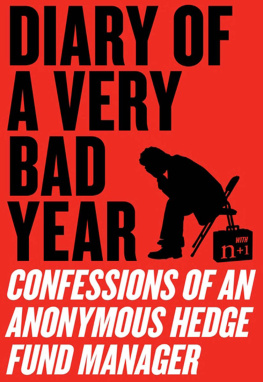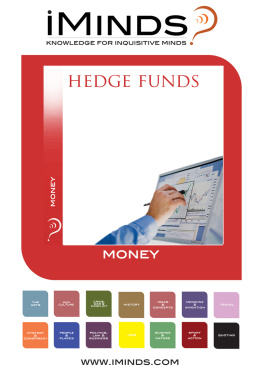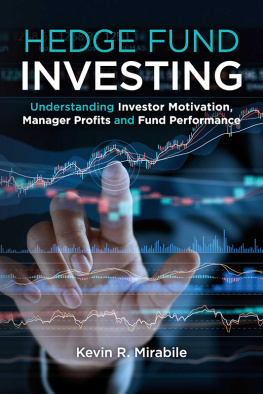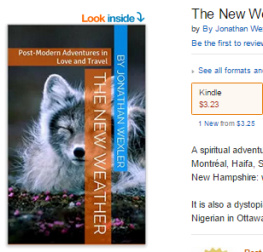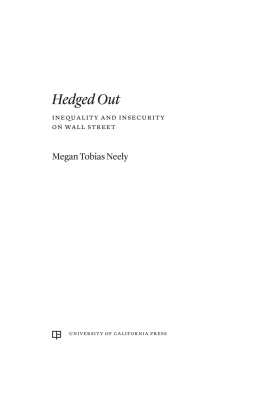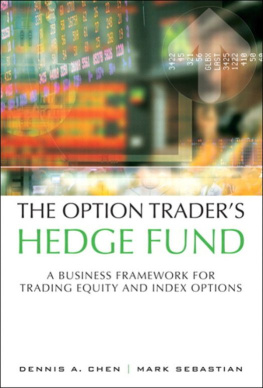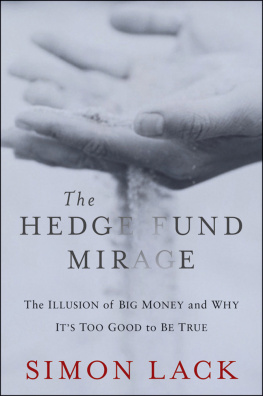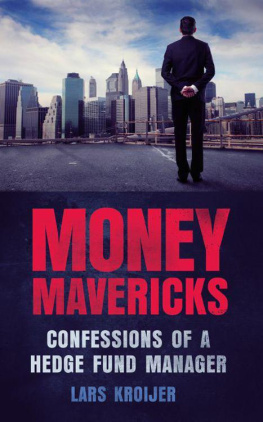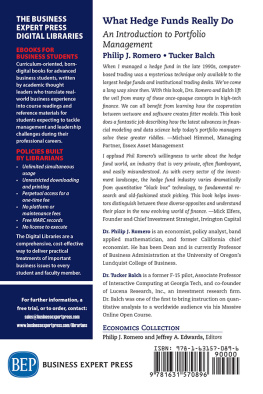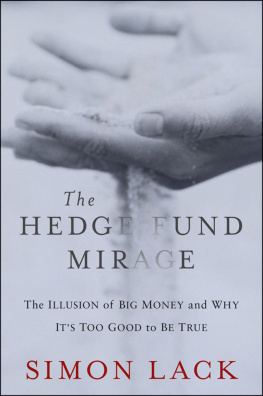The anonymous hedge fund manager (HFM) in this book is a friend of a friend who was introduced to me in late 2006 as a financial genius who ran the emerging markets desk at a respected midtown fund. I was a little skeptical. Id been to college with a great many people who later went into finance, but this was mostly so they could keep working a lot and drinking beer and watching football afterward. HFM was not like these folks at all. Finance was not a social event but an intellectual vocation for him; he spoke quickly, often too quickly to follow, and told very funny stories about the world he was in. When the first news about the financial meltdown started appearing in the nonfinancial press, I asked him for an interview, to see if he could explain it to me, and on a Sunday afternoon in late September 2007 we sat down outside a coffee shop in Brooklyn and spoke for two hours about subprime mortgages, paradigm shifts in finance, the problem with expertise, and the recent troubles with black box trading systems. I was an educated American male in my early thirties who lived in New York and Id never heard of any of this stuff.
It took me a long time to transcribe the tapes, partly because there was a lot to do but also because I was worried that the interview hadnt worked out and Id wasted HFMs time. I had been entertained when talking to him, but there wasnt that moment of personal revelation that you get used to waiting for in an interview, if youve done enough journalism. When the transcript was finally finished, I read it through and was amazed. HFM had explained the causes of the crisis with a clarityand a granularity, a specificitythat I hadnt seen anywhere else. There wasnt a single moment of revelation, because he spoke in entire thoughts, in entire stories; in a way, the whole thing was a revelation. We posted the interview to the website of our magazine, n+1 , in part because we thought people in the literary community n+1 is mostly a literary magazinewould be interested to hear how a financial professional viewed the economic situation. We were right about that. But we didnt anticipate how many business-oriented sites would link to and quote from the interviews. The lucidity of HFMs thinking on these subjects was as new to them as it was to us.
HFM and I sat down for another interview in March 2008, after the collapse of Bear Stearns. Once again HFM discussed the financial situation, but he also let his mind roam freely over the other things he was worried aboutthe television set on the trading floor at the hedge fund, the Argentinian pots-and-pans bank run of 1998, the state of hedge funds generally. For the second interview I asked one of our interns to transcribe it over the weekend, and we had it up by Monday. A few weeks later we got a report from a friend in business school who said hed arrived at lecture one day to find that the professor had put two quotes on his blackboard: one from Alan Greenspan, and one from HFM.
The next interview we did was in September 2008, just days before the Lehman bankruptcy sent markets into shock. Since then, weve done one interview every two months, on average. Each time, HFM told me something I didnt know or hadnt thought about; he also told me that he was beginning to experience doubts about the industry he was working in.
In going through the transcripts now, a number of things surprise me. One is the tireless magnificence of HFMhe never stops thinking, never stops turning ideas, concepts, and new facts over in his mind. He is, in a sense, dogmaticit is the dogma of the market, that the efficiency of the market is always going to lead to the best result for everyonebut not in a way that wont allow new information in. As the crisis deepens, he sees the behavior of banks who would pull his financing; as it begins to recede, he sees the way that banks have returned to asking for low margin against risk, because even though it exposes them to danger, the salesman will collect his commission today and someone else will deal with the consequences tomorrow; he sees the way the financial community has dusted itself off and gone back to business as usual. And he draws his conclusions. He sees how things are going, and in certain instances he changes his mind. That a mind so excellent, so generous, so curious, should spend all its time on relative value trading in foreign jurisdictions and yelling at people who refuse to pay him backwell, as HFM says, that is a philosophical question, and beyond the purview of the mere bond market. But its a philosophical question he begins to tackle on the far side of the crisis, in interviews 7, 8, and 9.
Another thing I notice, reading over these sessions, is that the interviewer (me) is shockingly and embarrassingly ill-informed. I consider myself a person of the left, which means in part that I consider economics to be a prime factor in human life. In fact, I consider a lot of what we think of as human life, as news, things such as politics and culture, to be determined by economics. But I know almost nothing of economics. I dont think this should disqualify me from membership in the leftI dont consider it the obligation of all good-hearted people to know what a credit default swap is, unless they want tobut lets just say that my ignorance is part of this particular document, and Ive left it intact. I know a little more now than when I began, and I realize I should have pressed harder on some of these questions. But as I say, by the end of the interviews HFM began to press on some of them himself.
Finally, I should admit a personal interest. At the beginning of the property boom (around 2003), a dear friend of mine ran into some financial troublehis business foundered and he lost his source of income. All he had (in addition to his beautiful family) was a beautiful house, in a good location, and he borrowed against it, hoping that things would turn around. He took a home equity loan, or line of credita HELOC, the ugliest and most ominous of all the ugly acronyms that the crisis gave birth to. My friend could take the HELOC because the house, like everyone elses, was rapidly appreciating. Why sit on that money? He and his family began to live on it while he looked for work. When home prices began to level off in 20056 and then finally to plummet, that loan turned into a bad idea. My friend was in trouble. I wanted HFM to help me figure out what would happen to him.
Another thing that happened while we were doing the interviews, a much more terrible thing, was that a friends uncle, whod been involved in mortgage brokering and had gone bust the way many of the mortgage brokers did, committed suicide. This was in the summer of 2008, after the housing market had collapsed but before the consequences had reached the broader, real economy.
These were stories that took place, as HFM would say, on the margin. During the crisis, there were enough of these storiesfor the subprime mortgages had been bundled together into bonds, which were sold off to investment banks, which sold them off to European banks, which sold them to their customersthat they migrated to the center of American life. Now, as the crisis wanesor at least, with the damage done, news of it wanesthese stories of despair have receded again to the margins. As the billionaire investor Sam Zell said of the many poor people who were given home loans so that the loan originators could make money by selling them to Wall Street, Those people should go back where they came from. Theyre going. But the consequences of the years of subprime lending and securitization, of too-easy money and greed and all the vices it gave birth to, will be felt for a long timenot just in the disappearance and reform of some of the Wall Street banks that foolishly put money on those loans, and not just in the battering that ordinary peoples retirement savings took in the stock market, but in an increase in inequality.

